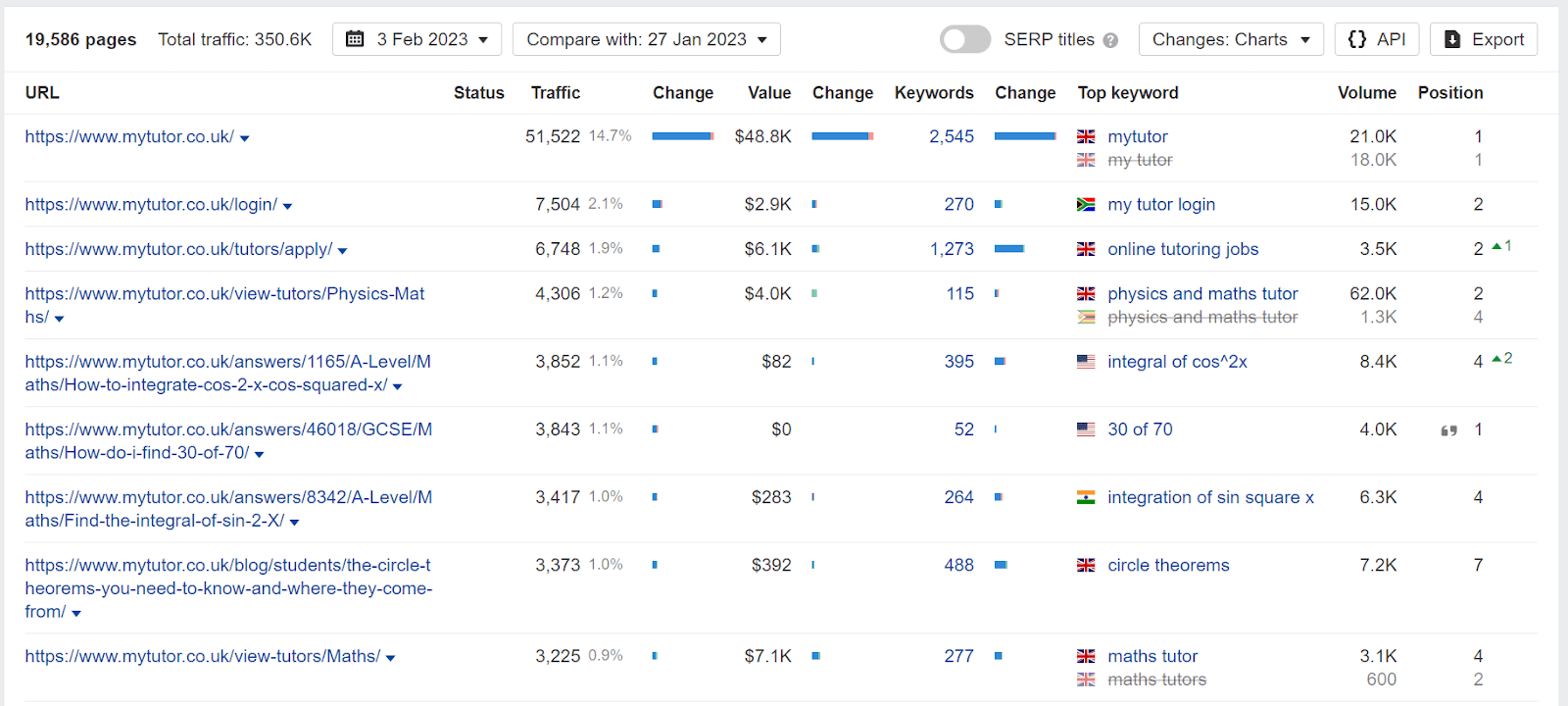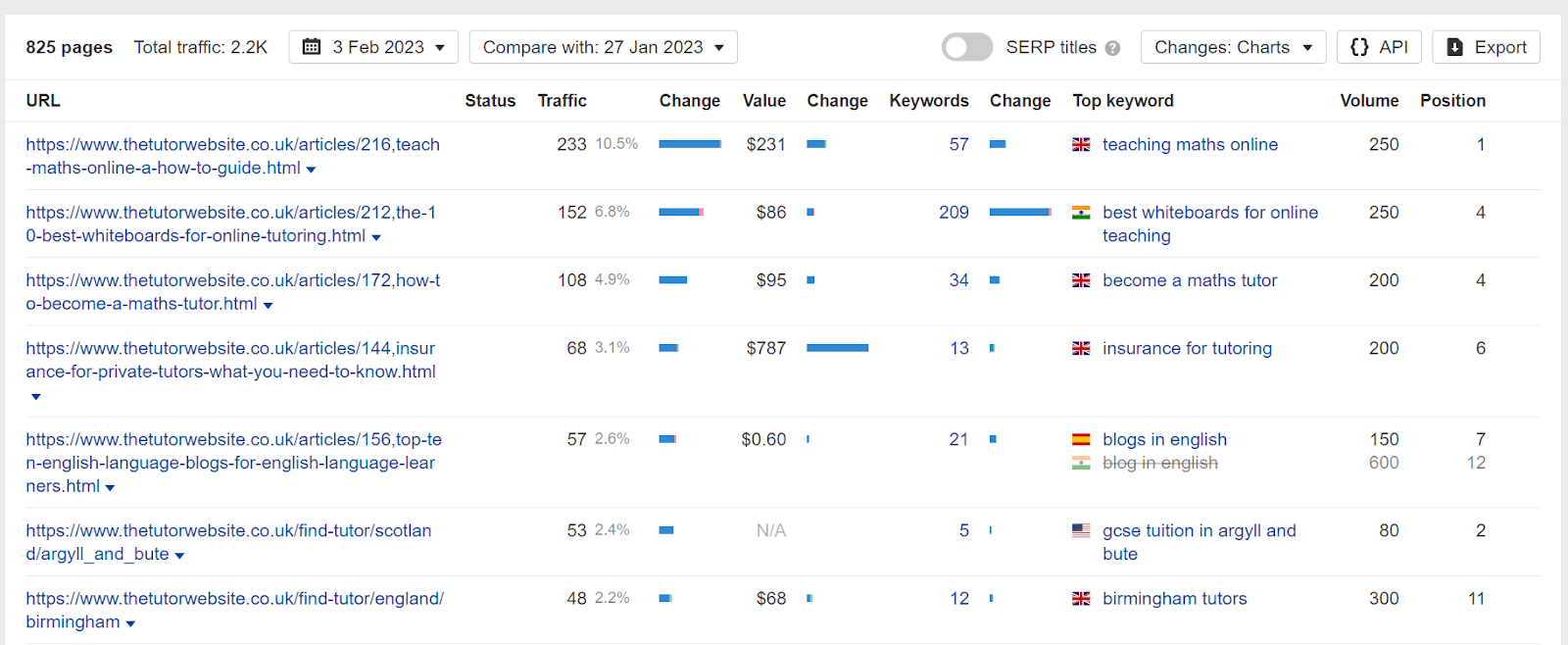As an education service provider, you are in the business of changing lives and shaping futures. But how do you reach those students who need your services the most? With so many educational providers vying for attention, it can be hard to stand out in a crowded market. But what if there was a way to connect with potential students when they are searching for your offer? That’s the power of SEO. Optimising your website and content can increase visibility, build trust with your target audience, and attract more qualified leads.
In a world where online search plays a major role in the decision-making process, having a strong SEO strategy is essential for the success of your education services. Don’t miss this opportunity to take control of your online presence and reach the students searching for your support.

Why is SEO for Education Services Important?
Most educational institutions have limited budgets, so it’s vital to invest your money wisely to maximise these funds. Many assume paid advertising is a good option because it can attract traffic immediately. However, if you opt for something like Pay-Per-Click (PPC), where you pay for each click or impression, the traffic only lasts as long as you keep paying.
On the other hand, SEO is a long-term approach to improve your website’s visibility and ranking in organic search results. It can save you money in the long run and attract high-quality leads who are actively searching for your services. SEO helps educational service providers build a solid foundation online, so they still reap the rewards even when they stop paying for SEO support. Doing this not only stretches the budget and increases ROI over time, but it also helps establish credibility within the industry.
SEO is crucial for creating an online presence that search engines (aka Google) and your target market trust. When done correctly, Google is more likely to rank your site over your competitors, making it easier for people to find your education services.
In short, SEO has a huge advantage, as PPC requires a constant stream of capital, and the cost increases over time. Therefore, SEO is the most cost-efficient option if you’re looking to maximise your educational marketing budget.
SEO Trends for Educational Institutions
As the digital landscape evolves, so do the SEO trends that educational institutions need to keep an eye on. Here are some of the most significant trends that are shaping the way schools and colleges approach their online presence:
- Prioritising Career Preparation – More and more students are using search engines to find institutions that offer robust career preparation. Schools highlighting their career services, internship opportunities, and successful alumni in their SEO strategy can attract these career-focused students. For example, using keywords related to specific career paths or industries in your website content can help your site appear in relevant search results.
- Expanding Online Learning Options – The demand for online learning has skyrocketed, and it’s not slowing down. Institutions offering online courses or degrees should ensure that their SEO strategy reflects this. This could involve creating dedicated pages for each online course, complete with detailed descriptions, learning outcomes, and enrolment information, all optimised with relevant keywords.
- Navigating Increased Competition – With more educational institutions recognising the power of SEO, the competition for top spots in search results is fiercer than ever. Schools must track their SEO performance regularly, keep up with algorithm updates, and continually optimise their content to stay ahead.
- Attracting International Students – As the world becomes more interconnected, attracting international students is a growing priority for the education industry. Schools should consider implementing multilingual SEO and optimising their website content for keywords in different languages. Additionally, creating content that addresses the concerns of international students, such as visa information and accommodation options, can improve your institution’s visibility in global search results.
Staying on top of these SEO trends can help educational institutions navigate the ever-changing digital landscape and reach their target audiences more effectively.
Search Demand for Education Services on Google
How do you know it’s worth investing in organic growth tactics? Are there enough people online searching for your services? Before you invest in SEO for education services, you need to make sure it’s a viable option. Analysing the search demand for your niche is a great way to do this.
Since there are so many avenues to explore under the umbrella term ‘educational services,’ let’s use tutoring as an example.

Tutoring is a vast topic, and there is a lot of competition between service providers. The above screenshot shows the search demand for the keyword ‘tutoring.’ Using Ahrefs, an SEO software, we can view data from all over the world. In this case, the image tells us an average of 83,000 people are searching for tutoring every month. That’s a lot of potential leads for your business!
Moreover, this data also highlights the breakdown of this demand. For instance, there are an average of 34,000 searches from the United States every month and 4,200 searches from the United Kingdom. Tutoring is only one of many educational services, indicating that thousands of people search for your services every month.
Your Audience Uses Many Search Terms to Find Educational Services
In the example of tutoring, we know there is a lot of potential but also much competition. You will not get the results you want from keyword stuffing or selecting a few keywords and hoping for the best. As SEO expert Rand Fishkin says:
“On-page SEO is no longer satisfied by raw keyword use. Matching keywords to searcher INTENT is critical.” – Rand Fishkin, Founder and CEO at SparkToro
So, how do you use SEO to break through the noise and appear on the first page of Google?
First things first, an SEO professional wouldn’t just target one word. Since your audience uses hundreds of different search terms to find services like yours, it’s vital to conduct thorough research to identify their interests and how they search. Once you pinpoint these, you can tailor your site to these keywords.
For example, people looking for education support may search for the following:
- Education services in specific locations (e.g., tutors in London)
- Types of education services (e.g., tutoring)
- Education services for specific people or age groups (e.g., tutoring for teenagers)
- Questions about the industry
SEO experts will analyse the data to assess the search demand of various keywords. Once they find enough relevant search terms, they create high-quality pages that rank well on Google to help you collect organic traffic.
Different keywords will target different search intents, such as people learning about your service or those ready to make a transaction. An SEO professional will position your website in the right searches to achieve the desired outcome, whether it’s increasing brand awareness, generating leads, or making a sale.
By targeting your ideal buyer at different stages of their journey, you start building Topical Authority (TA). TA is the extent to which you demonstrate your expertise across the entire topic and helps search engines understand that your site is a trusted source in the niche.
The below image shows the average monthly search volume for some keywords related to tutoring services.

Although some have a lower search volume, it is easier to rank high on Google since there is less competition. Moreover, some low-demand phrases have super-high search intent, making it a valuable opportunity to convert viewers into leads or even buyers.
Targeting a range of keywords is particularly important if you have a new website. It’ll be extremely difficult to rank on page one for a high-competition word such as ‘tutoring’ because you’ll be going up against competitors with established websites and recognised authority. However, as you win the top positions for low-demand keywords, you’ll build topical authority for your website. Over time, Google will view your site as credible and trustworthy for the highest spots. SEO is an effective tool for doing this as it helps Google understand that your pages are better than the competition and will make it easier to rank for competitive keywords in the future.
The Role of Blogs in SEO
A well-maintained blog can help your school’s website rank higher in search results. Search engines favour websites that regularly update their content, and a blog is an excellent way to ensure your site stays fresh. Each new blog post adds a new indexed page to your website, increasing its visibility for search engines.
Moreover, a blog allows you to target more keywords relevant to your school. For instance, you can write blog posts about different aspects of your school, such as specific courses, school events, or faculty profiles. By naturally incorporating relevant keywords into these posts, you can improve your site’s ranking for these terms.
Blogs also provide an opportunity to engage with your school community. By creating content that resonates with students, parents, and staff, you can encourage them to share your posts on social media. This not only increases your online visibility but also generates backlinks to your site, further boosting your SEO.
For example, you might write a blog post about a recent school sports event. The post could include details of the event, photos, and quotes from participants. This type of content is likely to be shared by those involved, helping drive more traffic to your site.
However, it’s important to remember that quality is crucial when it comes to content creation. Search engines can recognise and penalise low-quality content, so it’s essential to ensure your blog posts are well-written, informative, and relevant to your audience.
Local SEO for Educational Institutions
Local SEO is pivotal in helping schools and colleges connect with their immediate community. By optimising your online presence for local search, you can make it easier for parents and students in your area to find your institution. Here are some key ways to enhance your local SEO:
- Use Location-Specific Keywords – Incorporating location-specific keywords into your website content can significantly improve your visibility in local search results. For instance, if your school is in Manchester, you might use keywords like ‘primary school in Manchester’ or ‘Manchester beauty college’. These keywords should be used naturally within your content, meta descriptions, and title tags.
- Ensure NAP Consistency – NAP stands for Name, Address, and Phone number. It’s vital to ensure that your school’s NAP information is consistent across all online platforms, including your website, social media profiles, and directory listings. Inconsistencies can confuse search engines and lower your local search ranking. For example, if your school is listed as ‘St. Mary’s College’ on your website, the name should be listed the same way on all other platforms (i.e. not as ‘Saint Mary’s College’ or ‘St Marys College’).
- Optimise Google Business Profile – A well-optimised Google Business Profile can significantly boost your local SEO. Make sure your listing includes accurate and up-to-date information about your school, including your NAP details, opening hours, and a link to your website. Regularly post updates and respond to reviews to show that your listing is active and managed.
- Encourage Reviews – Online reviews can influence your local search ranking. Encourage parents and students to leave reviews on your Google Business listing and other relevant platforms. Positive reviews can enhance your online reputation and make your school more appealing in local search results.
- Use Localised Content – Creating content that is relevant to your local community can improve your local SEO. This could include blog posts about local events your school has participated in or pages dedicated to local partnerships.
Link Building Strategy
Link building is essential to SEO, acting as a vote of confidence from one site to another. When your school’s website has a healthy portfolio of links from reputable sources, Google views your site as more authoritative and trustworthy, which can improve your ranking in search results.
Internal links are those that connect different pages within your website. For instance, a blog post about your school’s art programme might include a URL to the page detailing your art curriculum. These links help search engines understand the structure of your website and can guide visitors to more relevant content, enhancing their user experience.
External links, on the other hand, are links from your website to other sites. For example, you might include a URL to a news article featuring your school or a study relevant to a blog post topic. These links can add value to your content and help establish your site as a reliable source of information.
Backlinks, or inbound links, are arguably the most influential in terms of SEO. These are links from other websites to your site. For example, a local news site might include a URL to your school’s website in a story about your recent fundraising event. High-quality backlinks can significantly boost your SEO, as they signal to search engines that your content is valuable and reputable.
It can be a challenge to obtain quality backlinks as they require recognition from others. However, high-value shareable content that engages with your community and establishes partnerships with local organisations can encourage others to link to your site.
Building a robust link profile requires a strategic approach. For internal links, make sure to connect relevant pages together in a natural way that enhances the user experience. For external links, choose reputable, high-quality sites that complement your content.
Link building doesn’t happen by magic and takes a well-planned strategy. However, when done correctly, it can significantly enhance your school’s SEO to help you reach more prospective students and their families.
Technical SEO Tips for Educational Institutions
Ensuring the site is technically up to scratch is another important aspect of a successful SEO strategy. To have any chance of performing well on Google, your school’s website must be well-structured, fast to load, and accessible on mobile devices. Here are some key areas to focus on:
- Your Site Structure – A well-structured website is not only easier for users to navigate, but it also helps search engines understand and index your content. Ensure your site has a clear, logical structure, with each page accessible through a set of links. Use descriptive URLs that reflect the content of each page, and organise related pages into categories or subfolders. For example, you might have a main ‘Courses’ page on your school’s website, with subpages for each subject area.
- Site Speed – The speed at which your website loads can significantly impact your SEO. Search engines favour fast-loading sites, and users are more likely to stay on a site that loads quickly. To improve your site speed, consider compressing large images, minimising the use of heavy scripts, and using a content delivery network (CDN) to deliver your content more quickly to users around the world. If your school’s website has a gallery of high-resolution images or large prospectus files, consider using a tool to compress these images without losing quality.
- Mobile Optimisation – With an increasing number of people accessing the internet via mobile devices, your website must be mobile-friendly. This means ensuring your site is fully responsive and adjusts to fit any screen size. Additionally, ensure your site is easy to navigate on a mobile device, with clear, easy-to-click buttons and links. For instance, if your school’s website has a menu with small, closely spaced links, consider redesigning it to be more mobile-friendly with larger, easier-to-tap buttons.
There are many other technical areas to consider to get the most out of your SEO efforts. Consider getting a full technical audit completed by an SEO agency to flag the issues hindering your site’s performance.
Educational Service Providers Already Getting SEO Results
Other service providers in your niche use SEO to improve online visibility and attract clients. Let’s take a look!

The online tutoring platform MyTutor is a great example of SEO at work. But what do the above figures mean? Firstly, organic traffic refers to the average amount of visitors they get per month from organic searches. In other words, it’s free traffic! They aren’t paying for ads but rather letting their SEO efforts do the work. Consequently, this site attracts 351 thousand people to their website every month through organic search results.
However, traffic value is another vital figure to consider. In this case, their traffic value tells us how much it would cost the website owner if they wanted to achieve the same amount of traffic from organic searches in paid advertisement. For clarity, this means they are saving an average of $126,000 a month by investing in SEO.

We can also look at which pages generate the most organic traffic for this brand. The above screenshot shows this site using SEO to target people looking for specific tutors. For example, they rank in position 2 for the keyword ‘physics and maths tutor’ and the top position for their brand name. Analysing this data gives you a brief insight into their SEO strategy and highlights their excellent brand awareness.
This example shows the potential of investing in SEO for education services. However, the above website is an industry leader, making it easier to see significant results. So, is SEO still effective for small websites? Yes! The following example shows why.

Here we have a tutoring agency whose online presence is considerably smaller than the previous example. The data indicates they are getting 2,200 average monthly visitors from organic searches. If they were to use PPC, they would be paying $2,700 every month to get the same results they get for free through organic search! While this may not seem like a lot compared to industry leaders, they still save thousands in advertising every month.

Despite not being an aggregator, this site has secured position one for the keyword ‘teaching maths online’ with an educational how-to article. In fact, many of their web pages rank on page one of Google for relevant search terms.
Furthermore, the keyword ‘Birmingham tutors’ shows us they are using a tactic called local SEO to target specific locations. Moreover, many of their top pages are blog posts that answer common questions and offer guidance. An SEO expert might review this data to identify where they are missing opportunities to attract organic traffic. Alternatively, they might consider other SEO tactics, such as technical fixes and backlinks, to ensure their site is optimised from all angles.
How Can an SEO Company Support Your Growth?
Marketing your educational services online takes time, effort, and expertise. While learning how to do it yourself is possible, it might take years to implement and achieve significant results. To avoid wasting time and money on ineffective strategies, you might consider outsourcing SEO.
When you invest in an experienced SEO agency like NUOPTIMA, you’ll gain access to numerous marketing professionals, such as SEO writers, editors, technical specialists, and more. With years of experience behind us, we tailor our services to suit your business goals and get you on the first page of Google.
Our team understands the complexities of SEO and the importance of adhering to Google’s strict guidelines. That’s why we take a holistic approach to set your website up as an authoritative source in the eyes of Google while still providing genuine value to your customers.
Here are a few ways an SEO agency can support you:
- Run an SEO audit to identify what is working, areas of improvement, and technical fixes.
- Create a data-driven strategy that considers your budget, competitors, and target market.
- Optimise existing pages to comply with Google’s regulations and best practices.
- Analyse your site with your competitors to identify relevant keyword clusters.
- Create and publish SEO-optimised content to help your website rank for more keywords.
- Create original backlink content and arrange for links to be placed on relevant educational websites.
- Curate additional pages to increase opportunities to direct organic traffic to your website.
At NUOPTIMA, we take an active role in your growth and continue monitoring your success. Our expert teams are ready to address any issues that may arise, whether it’s updates, technical fixes, or anything else. So, if you’re looking for a hassle-free solution to promote your educational services, book a free call with one of our specialists to find out if SEO is right for you.
Propel Your Education Services with SEO
In the ever-evolving landscape of education services, standing out is key. With the right SEO strategies, your education service can rise above the competition, attracting more potential students, parents, and partners. SEO is not just about increasing website traffic; it’s about attracting the right kind of traffic – those who are actively interested in what your education service has to offer. Don’t let your education service’s potential get lost in the digital noise. Start your SEO journey with NUOPTIMA today and watch your growth accelerate.
FAQ
SEO is important for education services because it helps improve their online visibility. With the right SEO strategies, an education service’s website can rank higher in search engine results, attracting more potential students, parents, and partners. It’s a cost-effective way to increase website traffic and generate awareness for your education service.
SEO is a long-term strategy, and it often takes a few months to start showing results. However, once your website starts ranking higher in search results, it can retain those positions even if you pause your optimization efforts.
Local SEO is a strategy that helps businesses rank higher in local search results. For education services, this means appearing in search results when potential students or parents are looking for services in their local area. It’s a powerful way to attract local support and build a strong presence in your community.
NUOPTIMA provides a range of SEO services for education services, including keyword research, high-quality content creation, link building, and technical SEO. These strategies can improve your website’s rankings, increase its relevance and credibility, and attract more support for your education service.
You can get started with NUOPTIMA’s SEO services by booking a slot to talk to one of our SEO experts. We’ll discuss your needs and how we can use SEO strategies to improve your education service’s website rankings.



